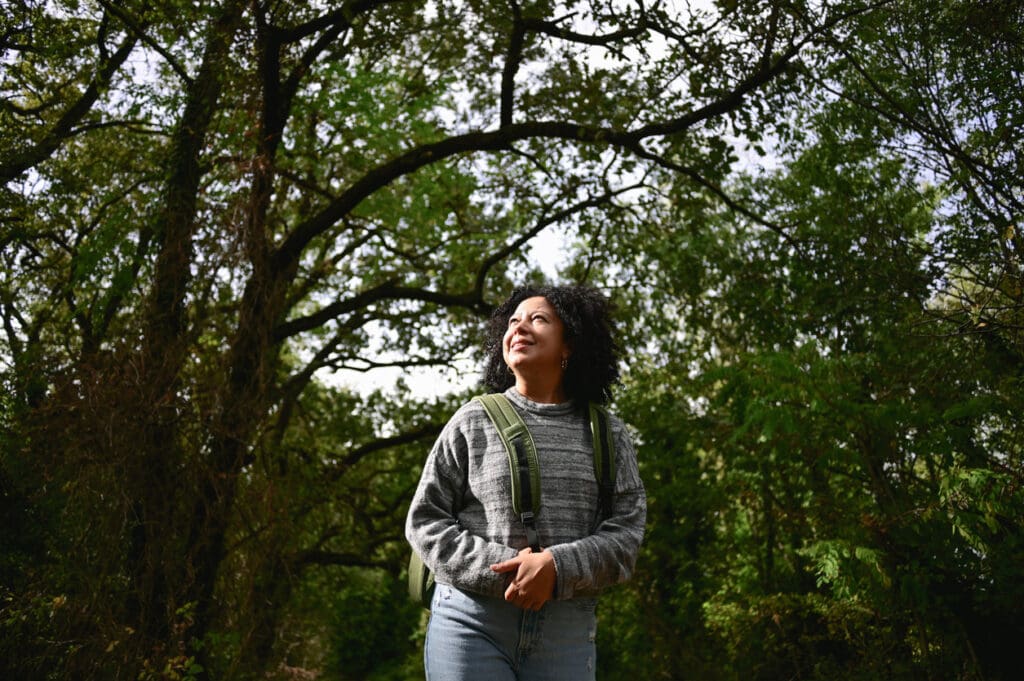
In the face of mounting climate crises, a growing number of contemplative researchers are exploring the connection between mindfulness practices and our relationship with the natural world. While writers, mystics, and sages have long described moments of profound connection with nature, less is known about how to cultivate such experiences and their impact, not only on individual well-being, but our commitment to sustaining the web of life on Earth.
What can contemplative wisdom traditions teach us about nurturing the human-earth connection? And would people be more apt to pursue sustainable lifestyles if they could tap into the transformative potential of earth awareness practices?
These are questions at the heart of Chilean neuroscientist Constanza Baquedano’s research. In 2023, Mind & Life awarded Constanza a Francisco J. Varela Grant to study the effects of Buddhist and Indigenous contemplative practices on nature connectedness. Specifically, she hopes to learn about the extent to which such practices not only connect people to nature but promote psychological well-being and pro-ecological behaviors.
“Creating a sustainable future will take a paradigm shift in the human-nature relationship,” says Constanza. She and other researchers view our disconnection from nature as a fundamental obstacle to effectively addressing the climate crisis. Modern lifestyles, she points out, are a big part of the problem with over half the world’s population living in urban areas. At the same time, people globally spend an average of 6 hours and 40 minutes a day in front of a screen.
“Creating a sustainable future will take a paradigm
shift in the human-nature relationship.”
— Constanza Baquedano
Standard environmental education programs—with their focus on transmitting technical knowledge—often fall short of connecting people to nature on a visceral level, Constanza explains. “I want to see if the affective component fostered through contemplation and sensory experience can enhance nature connectedness.”
This research emerged out of her own personal experience. Constanza grew up in the Andean region of Cajón del Maipo in central Chile, an area known for its picturesque mountains, rivers, forests, and abundant wildlife. For generations, her family has lived in close connection with nature. Her grandparents raised cattle, passing along the stewardship of the land to her parents. After years devoted to her academic studies abroad, Constanza recently returned to her family’s property, converting it into a wildlife preserve. She now divides her time between her childhood home and the city of Santiago, where she’s an assistant professor at Universidad Adolfo Ibáñez.
Examining Nature Connectedness Across Traditions and Settings
Constanza and her team recently completed the first phase of their pilot study: conducting phenomenological interviews with 30 park rangers, Indigenous community members, and city dwellers, dividing them into three groups of ten. She intentionally focused on individuals covering a broad range of nature connectedness—from urban professionals to the Mapuches (“People of the Land”), the largest ethnic group in Chile, who have maintained a close connection to the natural environment for thousands of years. She credits Mind & Life co-founder Francisco Varela, a Chilean biologist and philosopher, with inspiring her to study individuals’ subjective experience using scientifically verifiable methods.
During the one-on-one interviews, study participants were asked to recall an experience when they felt deeply connected to nature. Each was prompted to describe any images that came to mind and sensations they felt in their bodies. Across the three groups, interviewees shared experiences of awe and wonder, and feeling part of something bigger. The experience of awe was often coupled with curiosity related to how nature “works,” and the mystery inherent in the beauty and complexity of natural phenomena. Differences, too, were noted with urban dwellers more apt to emphasize the silence and tranquility they found in nature.
The team is now preparing the second phase of their study: developing a contemplative intervention aimed at fostering nature connectedness. To be informed by the Phase One interviews, the intervention will combine mindfulness with close attunement to the senses.
To evaluate the intervention’s effectiveness, the team will recruit 60 university students to attend a weekend retreat at a nearby nature sanctuary. Half of the group will take part in a standard environmental education program featuring lessons on climate change, guided nature walks, species identification, and experiential activities. The other half will participate in the same activities with a key distinction—they will also practice mindfulness and compassion meditation in natural surroundings and attend teachings on interconnectedness.
As a last step, the team will measure the effects of the intervention using a variety of measurement tools, including electrophysiology and behavior. The researchers will evaluate participants’ predisposition toward animal welfare, the extent to which they are concerned about biodiversity loss, and pro-ecological behavior such as willingness to donate to an environmental nonprofit.
Before and after the intervention, all participants will fill out self-report questionnaires exploring the extent of their nature connectedness, corresponding feelings of well-being, and propensity toward pro-ecological behavior. This will be combined with post-intervention phenomenological interviews.
Through the study, to be completed in the summer of 2026, Constanza hopes to learn more about the experiential and physiological mechanisms through which nature connection takes place, while developing and testing an intervention rooted in diverse contemplative practices. By comparing the impact of traditional environmental education with that of contemplative nature-based practices, she hopes this project may help make the case for greater adoption of contemplative approaches.
Far from being an end in itself, Constanza’s research reflects her passion for driving positive change. She currently serves as Director of Science and Education at Lagunillas’s Nature Sanctuary, as President of the Andean Resilience Foundation, and Vice President of the ECOH Foundation, which studies human consciousness. She plans to publish her findings in peer-reviewed journals and to produce a “how to” manual to share the team’s contemplative intervention more broadly.
Ultimately, she seeks to “rekindle the human-nature relationship in ways that acknowledge our interconnected reality.”
Suggested Resources
- Read about 4 Ways Mindfulness in Nature Can Help Us Heal Ourselves and the Earth
- Learn about other Mind & Life grantees working to understand and heal the human-earth connection on the Mind & Life blog
- Explore diverse perspectives on strengthening the human-earth connection featured on Insights: Journey into the Heart of Contemplative Science
- Listen to contemplative leaders and climate advocates on the Mind & Life podcast
- Enroll in Mind & Life’s online climate course: The Mind, the Human-Earth Connection, and the Climate Crisis
- Check out a Mind & Life book, A Future We Can Love: How We Can Reverse the Climate Crisis with the Power of Our Hearts and Minds


